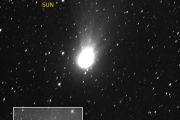
Copernical Team
Scientists solve solar secret
 The further we move away from a heat source, the cooler the air gets. Bizarrely, the same can't be said for the Sun, but University of Otago scientists may have just explained a key part of why.
Study lead Dr Jonathan Squire, of the Department of Physics, says the surface of the Sun starts at 6000 degC, but over a short distance of only a few hundred kilometers, it suddenly heats up to mor
The further we move away from a heat source, the cooler the air gets. Bizarrely, the same can't be said for the Sun, but University of Otago scientists may have just explained a key part of why.
Study lead Dr Jonathan Squire, of the Department of Physics, says the surface of the Sun starts at 6000 degC, but over a short distance of only a few hundred kilometers, it suddenly heats up to mor Astronomers reveal remarkable simulations of the early universe
 It looks like fireflies flickering in the darkness. Slowly, more and more amass, lighting up the screen in large chunks and clusters. But this is not a video about insects. It's a simulation of the early universe, a time after the Big Bang when the cosmos transformed from a place of utter darkness to a radiant, light-filled environment.
The stunning video is part of a large suite of simula
It looks like fireflies flickering in the darkness. Slowly, more and more amass, lighting up the screen in large chunks and clusters. But this is not a video about insects. It's a simulation of the early universe, a time after the Big Bang when the cosmos transformed from a place of utter darkness to a radiant, light-filled environment.
The stunning video is part of a large suite of simula Scientists develop most detailed model of the early universe to date
 It all started around 13.8 billion years ago with a big, cosmological "bang" that brought the universe suddenly and spectacularly into existence. Shortly after, the infant universe cooled dramatically and went completely dark.
Then, within a couple hundred million years after the Big Bang, the universe woke up, as gravity gathered matter into the first stars and galaxies. Light from these
It all started around 13.8 billion years ago with a big, cosmological "bang" that brought the universe suddenly and spectacularly into existence. Shortly after, the infant universe cooled dramatically and went completely dark.
Then, within a couple hundred million years after the Big Bang, the universe woke up, as gravity gathered matter into the first stars and galaxies. Light from these Chaos terrains on Europa could be shuttling oxygen to ocean
 Salt water within the icy shell of Jupiter's moon Europa could be transporting oxygen into an ice-covered ocean of liquid water where it could potentially help sustain alien life, according to a team of researchers led by The University of Texas at Austin.
This theory has been proposed by others, but the researchers put it to the test by building the world's first physics-based computer si
Salt water within the icy shell of Jupiter's moon Europa could be transporting oxygen into an ice-covered ocean of liquid water where it could potentially help sustain alien life, according to a team of researchers led by The University of Texas at Austin.
This theory has been proposed by others, but the researchers put it to the test by building the world's first physics-based computer si What will Australia's new Defence Space Command do
 Australia established a Defence Space Command in January this year, "to achieve our strategic space ambitions and lead the effort to assure Australia's access to space". The government also plans to spend around A$7 billion on space defence over the next decade.
Many areas within defence are already engaged in space activities, but Defence Space Command will bring them together. It will ai
Australia established a Defence Space Command in January this year, "to achieve our strategic space ambitions and lead the effort to assure Australia's access to space". The government also plans to spend around A$7 billion on space defence over the next decade.
Many areas within defence are already engaged in space activities, but Defence Space Command will bring them together. It will ai China releases images of Martian dust taken by Tianwen-1 orbiter
 China's Tianwen-1 orbiter has beamed back high-resolution images of Mars, showing dust storms on the surface of the planet.
Released by the China National Space Administration on Thursday, the new pictures with a resolution of 0.5 meters were captured by a camera on the probe, which has been operating in orbit for 609 days at a distance of 277 million km from Earth.
Track marks left
China's Tianwen-1 orbiter has beamed back high-resolution images of Mars, showing dust storms on the surface of the planet.
Released by the China National Space Administration on Thursday, the new pictures with a resolution of 0.5 meters were captured by a camera on the probe, which has been operating in orbit for 609 days at a distance of 277 million km from Earth.
Track marks left Sols 3422-3423 Studying the Silly Place
 No, Silly Place hasn't become a new place name, but I totally agree with Ryan, who was yesterday's blogger, that this is not our usual terrain. Would I want to go for a hike there, if I could? Sure, but very carefully, because this isn't a place to risk a fall. Too many pointy rocks, so, silly place certainly fits. The MAHLI image above is probably somewhere in the pile of rocks you saw under th
No, Silly Place hasn't become a new place name, but I totally agree with Ryan, who was yesterday's blogger, that this is not our usual terrain. Would I want to go for a hike there, if I could? Sure, but very carefully, because this isn't a place to risk a fall. Too many pointy rocks, so, silly place certainly fits. The MAHLI image above is probably somewhere in the pile of rocks you saw under th NASA provides update to astronaut moon lander plans under Artemis
 As NASA makes strides to return humans to the lunar surface under Artemis, the agency announced plans Wednesday to create additional opportunities for commercial companies to develop an astronaut Moon lander.
Under this new approach, NASA is asking American companies to propose lander concepts capable of ferrying astronauts between lunar orbit and the lunar surface for missions beyond Arte
As NASA makes strides to return humans to the lunar surface under Artemis, the agency announced plans Wednesday to create additional opportunities for commercial companies to develop an astronaut Moon lander.
Under this new approach, NASA is asking American companies to propose lander concepts capable of ferrying astronauts between lunar orbit and the lunar surface for missions beyond Arte All-private Axiom mission to ISS could launch as early as April 3
 Axiom Space, a private space company, expects to send the first all-private crew to the International Space Station as early as April 3 pending weather conditions and other scheduling concerns, NASA officials said Friday.
The Ax-1 mission passed its flight readiness review, representatives from NASA, Axiom Space and SpaceX - which is providing a Falcon 9 rocket to launch the mission --
Axiom Space, a private space company, expects to send the first all-private crew to the International Space Station as early as April 3 pending weather conditions and other scheduling concerns, NASA officials said Friday.
The Ax-1 mission passed its flight readiness review, representatives from NASA, Axiom Space and SpaceX - which is providing a Falcon 9 rocket to launch the mission -- Rocket Lab confirms next launch and updates on Q1 Revenue Guidance
 Rocket Lab USA (Nasdaq: RKLB) has announced the launch window for its next Electron mission, a dedicated mission for BlackSky (NYSE: BKSY) through global launch services provider Spaceflight Inc., begins April 1, 2022 UTC.
This launch window opening in April rather than March is weather related and will result in this mission and its related revenue being recognized in Rocket Lab's fiscal
Rocket Lab USA (Nasdaq: RKLB) has announced the launch window for its next Electron mission, a dedicated mission for BlackSky (NYSE: BKSY) through global launch services provider Spaceflight Inc., begins April 1, 2022 UTC.
This launch window opening in April rather than March is weather related and will result in this mission and its related revenue being recognized in Rocket Lab's fiscal 






























